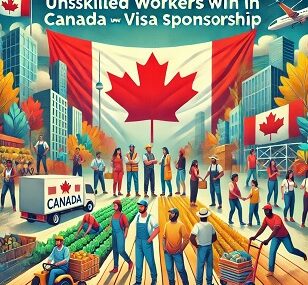Italy Seasonal Work Visa for Unskilled Workers 2025/2026
Introduction
Looking for short-term work abroad that pays in euros and gives you international experience? Italy’s seasonal work route is one of the most realistic options for unskilled and semi-skilled workers from outside the EU. Each year, Italy admits a limited number of non-EU seasonal workers in fields such as agriculture, hospitality, tourism, and domestic care. For many Nigerians and other Africans, this route offers legal employment, a chance to save, and practical skills you can use back home.
This guide explains exactly how the seasonal work program works in 2025/2026, who qualifies, how to get the job, how the visa and residence permit processes go, what to expect on arrival, how much you can realistically earn, common scams to avoid, and a practical checklist you can use to apply.
Quick overview: What the seasonal work route is
-
The seasonal work visa allows a non-EU national to work in Italy for a limited, seasonal period, typically tied to harvest cycles, peak tourism seasons, or other short-term demands.
-
Employers in Italy must secure formal authorization to employ non-EU seasonal workers before those workers can apply for the visa.
-
Once the authorization is granted, the worker applies for the visa at the Italian consulate in their home country, travels to Italy, and registers for a seasonal residence permit.
-
Seasonal contracts are time-limited; some permits last a few weeks up to nine months depending on the job.
Who should consider this route?
This route is ideal if you:
-
Have low or no formal tertiary qualifications but can do manual or service work.
-
Want legal short-term employment in Europe.
-
Are willing to work long hours, often outdoors or in service roles.
-
Need to earn foreign currency to support family or save.
-
Prefer a clearly temporary commitment rather than relocation.
Typical job categories for unskilled seasonal workers include:
-
Agricultural labour (harvesting, sorting, packing)
-
Hotel and catering support (cleaning, kitchen assistance, room attendants)
-
Fruit and vegetable picking and processing
-
Domestic support roles during high tourist seasons
-
Basic hospitality and event support
How Italy’s seasonal route works (step by step)
Step 1 — Employer secures authorization (Nulla Osta)
A genuine Italian employer must apply for and obtain the work authorization known as a nulla osta on behalf of the prospective worker. This happens through the local immigration office in the province where the job is located. The employer provides contract details, job duration, and accommodation arrangements.
Step 2 — Employer notifies worker / worker prepares documents
Once the nulla osta is issued, the employer or its representative notifies the worker. The worker gathers documents: passport, passport photos, job contract copy, proof of accommodation arrangements (if required), police character statement (where requested), and any other documents specified by the consulate.
Step 3 — Visa application at Italian consulate
The worker applies for the seasonal work visa at the Italian embassy or consulate in their country. The consulate checks that the nulla osta matches the worker’s application, verifies identity, and processes the visa. Processing times vary; applicants should apply as soon as the nulla osta is available.
Step 4 — Travel and arrival
After the visa is issued, the worker travels to Italy and should arrive within the period stipulated by the visa.
Step 5 — Register for the residence permit (permesso di soggiorno)
Within a few days of arrival (commonly 8 days), the worker must apply for a seasonal residence permit at the local post office kit or directly at the immigration office. The permit registers the worker’s status and allows legal employment for the duration of the contract.
Step 6 — Start work, register with social security
The employer must register the worker with the national social security system so wages, contributions and workplace protections apply. The worker begins the seasonal job.
Italy Seasonal Work Visa for Unskilled Workers 2025/2026
Key documents you will need
Prepare these documents in advance. Requirements vary slightly by consulate, so confirm with yours before applying:
-
Valid international passport (at least 6 months validity).
-
Recent passport-style photos.
-
Original job contract and proof of nulla osta from the employer.
-
Proof of accommodation or employer’s declaration that accommodation is provided.
-
Police clearance or certificate of good conduct if requested.
-
Any health certificates required by the consulate (basic medical).
-
Proof of travel bookings only if requested.
-
A copy of your academic or vocational certificates if relevant to the job.
Typical timeline from job offer to starting work
-
Employer applies for nulla osta: 2–8 weeks (varies by region and season).
-
Nulla osta issued and sent to worker: a few days to 1–2 weeks.
-
Visa appointment and processing at consulate: 2–8 weeks depending on workload.
-
Travel and arrival: as soon as visa is stamped and ticket is arranged.
-
Residence permit application after arrival: within 8 days.
-
Worker begins employment: immediately after permit initiation and employer formalities.
Start early. Seasonal quotas and employer timelines are strict; missing the window can mean waiting for the next calendar year.
How much you can expect to earn (realistic figures)
Wages depend on sector, region in Italy, and whether you are paid hourly, daily, or via a piece-rate (common in agriculture).
General expectations for unskilled seasonal roles:
-
Agricultural pickers: common pay models include daily wages or hourly wages. Net daily earnings can vary but expect an average range that, when calculated over full workdays, may translate into modest monthly net earnings. Exact pay depends on region and crop.
-
Hospitality support (cleaning, housekeeping): hourly wages aligned with national or sector minimum wages. Net monthly earnings depend on hours worked; working 6 days a week increases total earnings.
-
Domestic help: when live-in and legally employed, pay tends to be modest but with room and board included.
Important notes:
-
Wages in euros usually offer stronger buying power back home when converted to local currency.
-
Employers are required to pay at least the sectoral minimum wage plus insure and register workers for social benefits.
-
Realistic expectation: seasonal work is not a route to great wealth — it is an opportunity to earn in foreign currency and gain international experience.
Working conditions you should expect
-
Seasonal work can be physically demanding: early mornings, long hours, outdoor exposure in agriculture, repetitive tasks.
-
Accommodation is sometimes shared dormitory style; living costs in some rural areas are lower. Accommodation may be provided by employers or they may help source housing.
-
Employers must adhere to hygiene and safety standards. If you face unsafe conditions, Italian law allows you to report to local labour authorities.
-
Language: basic Italian helps. Employers often value workers who communicate in basic English or Italian, but many workplaces function with mixed languages.
Italy Seasonal Work Visa for Unskilled Workers 2025/2026
Legal rights and worker protections
Even as a seasonal worker, you have rights:
-
A written contract that states pay, hours, job duties, and contract duration.
-
Inclusion in national social security for contributions and insurance.
-
Minimum wage protections according to the specific sector collective agreements.
-
Health and safety protections at the workplace.
-
Ability to file complaints through labour inspectors if your rights are violated.
-
The right to a valid residence permit for the duration of your contract.
If anything in your employment appears illegal — e.g., payment below minimum wage, unpaid overtime, lack of contract — document everything and seek help from labour authorities, migrant support organizations, or consular services.
Common scams and how to avoid them
Scams are common around overseas seasonal work. Protect yourself:
-
Never pay for a nulla osta — the employer applies for it. If an agent asks you to pay for the authorization, be suspicious.
-
Beware of “guaranteed job” sellers — real employers won’t guarantee visas without following the formal process.
-
Check the contract — never sign blank documents or contracts in a foreign language without translation.
-
Validate the employer — ask for company details, address, and proof of prior hires. Verified employers will provide documentation.
-
Use the consulate — consular services can confirm the existence of a nulla osta linked to your name and employer.
-
Avoid large upfront fees to agents — legitimate application costs are minor (visa fees and standard document translations), not big “placement fees.”
If uncertain, consult trusted community organizations or the embassy before paying anyone.
How to find legitimate employers
-
Search for hospitality or agricultural employers who advertise seasonal vacancies and explicitly state they will apply for nulla osta.
-
Look for recruitment drives organised by Italian regional bodies or verified placement agencies known for legal placements.
-
Network: ask friends or community members who have worked in Italy for validated contacts.
-
Use transparent contracts: employers willing to explain the authorisation process openly are usually more legitimate.
Practical budgeting — approximate costs to plan for
Estimate these common costs (amounts are indicative and will vary by country and exchange rates):
-
Travel/airfare to Italy: variable depending on origin and season.
-
Visa application fee: consular visa fee.
-
Translation and document legalisation: small fees for translations and certified copies.
-
Residence permit issuance administrative fees: modest amounts collected in Italy.
-
Initial living costs until your first pay: 2–4 weeks of expenses if employer does not provide immediate support.
-
Contingency: budget some funds for emergencies and unexpected delays.
Plan conservatively: even with employer-provided housing and meals, you need some cash cushion for initial weeks.
Language preparation and cultural tips
-
Learn basic Italian phrases: greetings, numbers, days, simple instructions. This goes a long way on the job and in daily life.
-
Respect workplace rules and punctuality. Italian employers value reliability and attendance.
-
Familiarize yourself with local customs and workplace norms: for example, meal times, rest breaks, and hygiene expectations.
-
Bring appropriate clothing for the work: durable shoes for agriculture, modest uniforms for domestic roles, and warm clothing if working in colder regions.
Renewal, extending seasons, and longer-term options
-
Renewal is possible if your employer offers another seasonal contract and quotas permit a further authorization. Renewals are not automatic.
-
Accumulating legitimate seasonal work experience over multiple seasons can strengthen an application for other types of permits later, but transitions to long-term work status remain bound to quotas and further legal requirements.
-
Always ensure renewals comply with the law; working past the permit’s expiry is illegal and can jeopardize future travel.
Sample timelines and checklist (printable)
Typical timeline (example)
-
Weeks 0–4: Employer applies for nulla osta.
-
Weeks 2–6: Worker receives notification and prepares documents.
-
Weeks 3–8: Visa appointment and processing at consulate.
-
Week 9: Travel to Italy.
-
Within 8 days: Apply for seasonal residence permit.
-
Week 10+: Begin legally paid work.
Printable application checklist
-
Valid passport (6+ months).
-
Passport photos (2–4 recent).
-
Signed job contract.
-
Employer’s nulla osta notification.
-
Proof of accommodation (or employer declaration).
-
Police clearance if required.
-
Evidence of any prior travel if requested.
-
Sufficient funds for travel and initial living expenses.
-
Contact details for employer and local contacts in Italy.
Italy Seasonal Work Visa for Unskilled Workers 2025/2026
Sample employer email template (use when communicating)
Subject: Confirmation of Seasonal Work Offer — [Your Name]
Dear [Employer Name],
Thank you for offering me the seasonal position of [job title] at [company/farm name]. I am writing to confirm the details we discussed and to request the official documents I need to proceed with my visa application.
Could you please provide:
-
Copy of the signed employment contract showing start/end dates, pay rate, and working hours.
-
A copy or official notification of the nulla osta issued in my name.
-
Confirmation of accommodation arrangements.
-
Point of contact and address for the place of work.
I appreciate your help and look forward to completing the visa process. Please let me know if any additional documents are required from my side.
Sincerely,
[Your full name]
[Phone] — [Email]
Frequently Asked Questions (FAQs)
Q: Can I apply alone or do I need an agent?
A: You can apply alone. Agents are optional but be cautious — many fraudulent agents exist. Prefer direct employer contact and consulate guidance.
Q: How long does the seasonal permit last?
A: It varies; permits are tied to the job length and commonly range from a few weeks up to nine months.
Q: Can family members accompany me?
A: Seasonal permits are temporary and do not generally allow family reunification. Dependents cannot usually join on the same permit.
Q: Will I get social security and health coverage?
A: Legitimate employers register workers for social security; this provides basic protections. Health coverage depends on contributions and local arrangements.
Q: Can I change employer once I am in Italy?
A: Only with a new authorization and if your permit conditions allow. Changing jobs informally can be illegal.
Q: What if my employer does not pay me properly?
A: Document everything and contact the local labour office or a migrant support organisation. Italy has legal protections for workers.
Final practical tips and closing advice
-
Start early and be methodical: seasonal processes are time sensitive.
-
Prefer employers who explain the step-by-step and provide the nulla osta upfront.
-
Do not hand over large sums to “placement agents.” Small consular fees and translation costs are normal; anything beyond that should be questioned.
-
Learn basic Italian; it opens more opportunities and reduces misunderstandings.
-
Keep copies of all documents and correspondence — these protect you if disputes arise.
Seasonal work in Italy presents practical ways to earn foreign currency, gain international experience, and build skills. It is best approached with clear expectations: the work is temporary, sometimes hard, and often modestly paid but lawful seasonal employment, done right, protects you and offers concrete benefits.






